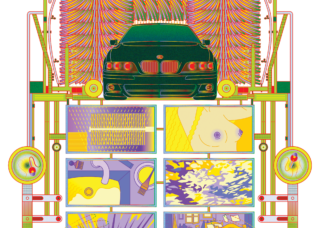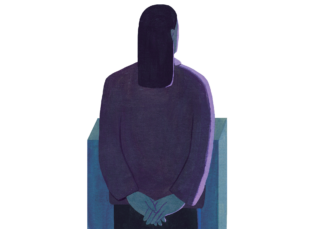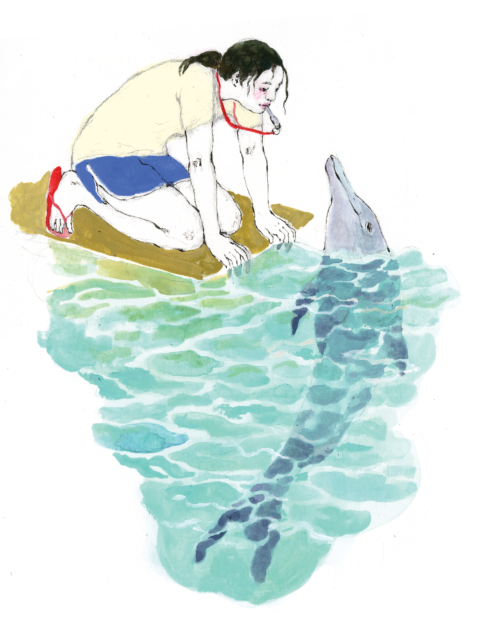
TO READ THIS STORY IN CHINESE, CLICK HERE.
It’s early. I sit with my coffee, watching a girl throw darts — one leg forward, one leg back. Her shoulder rotates gently, and a dart thwacks into the wall by the board. When I look closely, her eyes are shut. Eleven in the morning and she’s already drunk. Ought to take longer, at her age. She retrieves the dart and returns to the line, eyes still shut. I say, To your left. She shuffles. I say, Farther left. Another step. That’s good, I say, and she lets fly. Spring Roll ducks, and the dart hits the framed picture of Jim Morrison behind him, which wobbles but doesn’t fall. Spring Roll’s about forty: the bartender, DJ, and owner of this joint. Actually, “DJ” might be a bit of a stretch. His hair is curly, his face is square, and so is his taste in music: Morrison, the Beatles, some old country stuff now and then. He wipes away spilled booze and says, I’m cutting you off. The girl points at me: He’s the drunk. Spring Roll says, He’s drinking coffee. The girl turns to me: You hear that? He said stop drinking. Her eyes are dewy from the alcohol, fluttering like gills. She’s a scrawny thing. Her skin is pale and a little uneven, like a beach with a fine dusting of sand. I say, I haven’t seen you before, and I know all the alkies around here. She pulls out her wallet and says, Another vodka with orange juice. After some fumbling, she produces a debit card. Spring Roll says, The machine’s broken. I say, I have cash. Spring Roll glances at me: Professor Zhuang? I say, Have a seat, I’ll bring it to you. I pour her a glass of juice, no vodka. Spring Roll murmurs, Find out where she lives, she’s about to fall asleep. I go back to my laptop to save the document I was working on, then sit down across from her. She jabs a finger at me: You can’t drink any more. I push the juice closer: You’d better stop, too. She shakes her purse and says, I got paid today, I’m putting it on my card. I notice she’s wearing sneakers, her ankles as pale as her face. I say, Shall I call you a car? She picks up the glass and sets it down again: I’ll have a nap, wake me at twelve. I say, I can’t stick around that long. She pulls a whistle from her purse and hands it to me: Blow this at noon. With that, she slumps on the table and falls asleep. The steel whistle is long and narrow, with a flat mouthpiece and square opening, and it hangs from a strap that says “Ruan.” She must have had it a while — the left side of the “Ruan” character is almost rubbed off. Twenty minutes later, I have to leave for class. I put the whistle back round her neck and say to Spring Roll, Wake her up at twelve. He says, This isn’t a hotel. I point at the clock and say, Twelve, that’s forty minutes away.
In my afternoon class, I talk about Haruki Murakami’s obscure short story “Honey Pie,” the final one in his collection After the Quake. I don’t know why, but I was immediately drawn to it when I first read it fifteen years ago. After that, I sought out all of his books. Because of this one short story, I read every word Murakami ever wrote, which I don’t often do. When Li Wei was still with me, she used to say that’s why I became a writer, because I’m always obsessing over strange things. I said, Such as? She said, Such as a short story no one’s heard of, or the least attractive girl in class. I said, Don’t talk about yourself like that. She said, No, when you asked me out, I knew there was something behind your obsession. This conversation took place when we were at our most intimate, about six years ago. She was pregnant with Snow, and I’d just signed a contract for my first book. If she craved strawberries, I’d get her some. Grapes, ditto. She’d have one and leave the rest, so eventually I’d finish them. To this day, I still get nauseated at the sight of a grape or strawberry. I ate a lifetime’s worth in those months. It’s a hot afternoon, and my students are drowsy. I try a funny story to perk them up, but they’ve heard most of mine: that Joyce wrote with his wife’s panties over his face, that Hemingway said neither the old man nor the sea represented anything, but the sharks stood for his critics. A student pouts and blows sleepily at her bangs, which rise and fall like the beat of an ancient heart. I’ve seen a thousand kids like her, wild animals that strayed into my classroom by mistake. They forget every word I’ve said as soon as they walk out and find more congenial subjects: a Weibo post, a WeChat hookup. The world is full of things claiming young people’s attention. Downstairs from the classroom, a red lawn mower chugs across the neat rectangle of grass, its rumble as soporific as the drowsy afternoon, empty of content, endless. I imagine jumping out the window. How would these young people react? Probably get out their phones and take pictures of my prone body. After school, I swim two thousand meters in the university pool, then go back to the bar. The girl is gone, and so is Spring Roll. He usually has a nap in the back room around now, leaving the waiter to watch the place. Tomorrow morning, Saturday, I’m picking Snow up at nine. Sitting in the same place as before, I check the voice mail Snow left me. She wants to visit the aquarium, the one that opened recently not far from here, apparently the biggest in Asia, with lots of rare sea creatures and a shark walkway. A few activists staged a silent protest at the laying of the foundation until the police politely made them leave. They’d come from all over the country, and that afternoon were back on the train. I can’t imagine what they looked like, those animal lovers who took a twenty-hour train ride just to be here — and could they persuade their five-year-old daughters not to be interested in seeing seals and jellyfish? We breed animals, and we eat them. We have such terrifying power and face so many unique problems. A large aquarium can keep a thousand people employed. When they were building the place, tankers full of seawater would pass by, and once a crane holding an entire artificial island. A few days before the official opening, Spring Roll told me that for the past two nights, he’d seen trucks removing corpses, all different sizes, wrapped in black plastic, who knows where to. He said, This place didn’t suit them. You know why there isn’t an ocean here? Because it’s not the right place for an ocean. I didn’t think too much about the climate. Maybe right at the beginning, our town was an ocean, and it was peaceful with all that seawater pressing down on it. I thought about the Soviet Gulags, the frozen mounds of prisoners. If an excavator tipped over, it was left there as a memorial. But now Snow is saying she wants to visit the aquarium, and I agree without hesitation. I’m not an animal — they wouldn’t understand my needs.
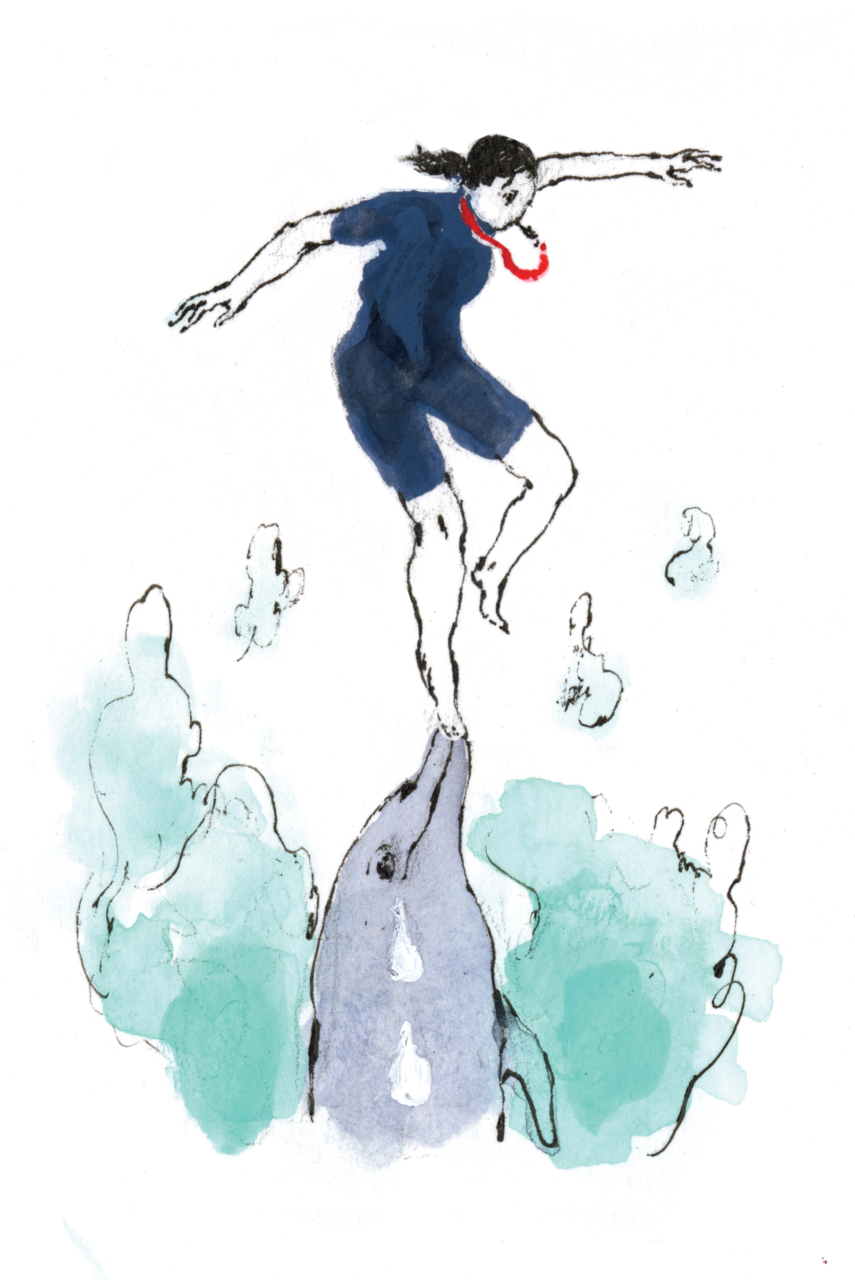
The bar is quiet. I put on headphones and get to work on the ending to a short story. From a certain perspective, I’m a college professor now, and writing is just a hobby. Yet these are also the times I belong entirely to myself, with the sun and the wind, and ocean currents coursing through my body. Short stories are tunnels — they should finish with light at the end. I have written this three or four times but haven’t found the right form. The light ends up too dazzling or too weak. After about an hour, my cell phone rings. A voice message from Snow: Daddy, ballet class got moved to tomorrow morning, I can’t go to the aquarium. Will you see it for me? Take pictures with the seals and dolphins, tell them why I’m not there. I message back: All right, I’ll go. Is your dance teacher strict? What have you been learning? Will you dance for Daddy next week? No reply. I wait half an hour, then carry on with my work.
First thing the next morning, I walk to the aquarium, which I haven’t seen up close before. Turns out it’s just one building in a massive theme park. From the entrance, I see a Ferris wheel and a carousel, as well as other things I can’t make out because an artificial hill is in the way. It’s not open yet. Everything’s quiet, just a few workers in uniform chatting and laughing, the dawn light on their faces. I thought I’d be the first one here, but there’s already a line of twenty people at the ticket counter. A kid with a shark’s fin strapped to his back rides on his dad’s shoulders while his mom stands by with bottled water and buns. It feels weird for a single man like me to be in this crowd. One for the aquarium, I say. The ticket is blue with a picture of a dolphin leaping out of the water. The seals are right by the entrance, mostly submerged, looking like they’ve been up all night. I don’t know how to get a photo — they look like rocks, perfectly immobile. An attendant comes over and says, Sir, would you like a picture with the seals? I say, Yes, but they’re all asleep. The attendant says, There’s one over there. Around the pool, behind a curtain, is a seal on a tall stool, blue markings on her body, sprouting long white whiskers. I say, Is that real? The attendant says, Of course, she’s three years old, we disinfect her every day so she can be hugged. I stand next to her and catch a whiff of antiseptic. She has lashes and black eyes, and her pelt feels like Jell-O. The camera is right ahead. I stand awkwardly, feeling like a voyeur when the attendant says, A little to your left. I say, This is fine. She says, Dot, you move to your right, then. The seal wiggles her tail and shifts toward me until her whiskers are brushing my shoulder. I whisper, My daughter’s name is Snow, I’m saying hi for her because she had dance class and couldn’t come. The seal sits up straight and doesn’t answer. Maybe I’m being silly. Even if she could understand, she doesn’t have the right limbs to sign an autograph. The attendant tells me, Pick up your photo at the exit, they’re all up on the wall. Go straight ahead, over that wooden bridge, and you’ll see the piranhas. I say, I don’t want to see the piranhas. She says, It’s not dangerous, we have very good safety measures, better than most aquariums, we had these made to order. It’s feeding time in ten minutes, you should go get a good spot. I thank her and walk onto the bridge. Sure enough, there’s an enormous glass tank full of tiny triangular fish, flat with giant mouths. They gnash their teeth, as if they know it’s time for food, then dart away suddenly. One has a corner of its tail missing, along with its balance and dignity, and so swims around lopsided. People surround the tank. Two wide-eyed kids press their noses to the glass, pointing. A man in waders and bloodstained oversleeves comes over with a plastic bucket. My phone beeps. Li Wei has sent me a video of Snow stretching, head pressed to her shin. She looks frail compared to the other kids, but I’m sure that just means she can jump higher. Li Wei is a strict mom. When she realized Snow had a talent for dance, she made sure not to let our daughter put on weight. In the six months since we separated, we’ve spoken on the phone now and then, starting with the kid and moving on to other topics. I don’t know if she’s forgiven me. She’s never said so, but also never mentioned taking me back.
The drunken evening, the unfamiliar body, the never-before-spoken filthy words, the early morning standing by the window — these memories haven’t faded. In fact, they’ve grown more vivid. I remember lying across the bed, shirt open, telling my student to do as I said and take off her bra in the most theatrical manner. She couldn’t manage it, so finally I just reached out and did it. I think I grabbed her arms and spun her around, so her back was to me. I’d never done that before, but now I sometimes find myself standing in class, and as the female students listen intently, I catch sight of their bangs and abruptly want to flip them over and press down on them. Then I have to think of funerals to steady myself, or else the most beautiful moments: Snow’s birth, her floppy neck, her strident cries.
There are plants on either side of the narrow path. Sunlight streams through the glass ceiling, fracturing into countless rays. I spot tortoises and lizards, one of which, realizing it’s being observed, freezes into the shape of a branch. I walk past countless glass windows, glancing aimlessly at the placards. Many of these creatures have come all the way from Africa or the Americas to sleep here. Some are venomous, some no larger than a cat; some devour the treats offered by visitors, clutching them with both hands and sticking out their tongues appreciatively. The next stretch is dimly lit. Turning the corner, I find a wooden boardwalk with a sign: dolphin show. There’s already a long line in front of the sign. A selfie with the dolphins, then I’ll head home. I wait in line for half an hour to be let into a round room that’s set up like a stadium, with seats along the walls and a high dome overhead like the top of a skull. I pay another ten yuan and grab a seat in the front row. Girls pass through the crowd hawking dolphin-shaped souvenirs: cell phone covers, key rings, water pistols that spurt liquid from the dolphins’ smiling mouths. A man with slicked-back hair warms up the crowd at the microphone. A kid runs forward and tries to look over the railing, but there’s nothing to see, just blue water, and he is soon whisked away by a parent. As I came in, I noticed an opening in the tank, covered with a fiberboard partition, probably leading to a smaller pool, like the athletes’ warm-up area at the Olympic Games. Finally, the emcee lets out a shout, and four young people, two men and two women, come out from behind the partition holding plastic buckets. The water starts to stir. From where I’m sitting, I can see four dolphins swimming slowly abreast into the main pool, each coming to its trainer’s feet. The performance begins. The trainers have whistles round their necks, and their buckets contain dead fish. The dolphins dance, leap, and toss balloons into the audience, who scramble for them. The dolphins can sing, too. Their voices are shriller than I imagined, like train whistles. I guess they need to be resonant because the sea is so wide. In this space, it’s a little piercing. When I stand to take a picture, I suddenly notice the trainers’ whistles. Just ten meters away, I can see every detail: they’re long and flat-mouthed, gleaming coldly. None of these four is the girl from yesterday; they’re all too tall. Expressionless, cheeks puffed out, they fling dead fish into the dolphins’ mouths. Every one of the dolphins is smiling. They look obedient, not at all dangerous, as they glide peacefully around, bursting abruptly from the water, alert for the whistle blasts — these are their cues to perform a variety of tricks. About fifteen minutes later, the four humans bow, and the dolphins vanish. The emcee says something else, and a girl in a wetsuit steps out onto a high platform by the pool, a whistle round her neck, too. She waves at the audience, and another dolphin appears in the pool, larger and faster than the ones before, zooming round the perimeter. Like a bottle falling over, the girl tumbles off the platform, splashing into the water. The crowd gasps, then absolute silence descends. The emcee is nowhere to be seen, just the churning water. I freeze, forgetting to take pictures. Then the girl bursts from the water, feet balanced on the dolphin’s snout. She turns a somersault and plunges back in. Applause starts up, and the children scream, Look, look, she’s still alive! I recognize her now. She’s in the water, riding on the dolphin’s back, surfacing again. The creature seems to have gained a second wind, going even faster than before, its snout slicing the water open like a knife. The girl starts out crouching, then slowly rises to her feet, and the audience stands, too, to get a better look. She is no longer holding onto the dolphin. One leg forward, one leg back, her torso arched, she looks directly ahead, whistle in her mouth. A long blast, and the dolphin vaults into the air. They soar apart, then land together. After a few repetitions, the dolphin begins circling the pool again, faster and faster, and the girl spreads her arms for balance. Finally, they sink into the water. The surface calms, and after a short time, the girl climbs the ladder alone. Shaking her hair loose, she bows to the audience. Her hair is drenched, a rubber band round her wrist ready to tie it back up.
The audience disperses, but I stay put. I sit by the pool all afternoon, like I’ve been hypnotized, and watch the whole show twice more. It’s exactly the same both times, with the girl jumping from the high platform, except at the last performance it’s starting to get dark, so they turn on the overhead lights. After the last batch of people leave, a cleaner starts hosing down the poolside railings. I walk over and ask, Who’s the manager? Without looking up, he says, There’s an office at the foot of the diving board. I say, That girl just now, is her surname Ruan? He turns around: What do you want? The hose dribbles a ring of water at my feet. I say, It’s fine, you’re busy. The office is sparsely decorated, with the performance schedule on the wall: two shows on weekdays, three on weekends and holidays. On another wall are trophies and banners. One reads: bringer of merriment, sower of love, brave and fearless, talent from above. The manager hears me out and says, I’ll have to ask my boss, I’ve never heard of such a thing. His hair is thin, his oval face haggard. Hard to imagine such a dried-out person existing in an aquarium. I say, Go ahead, I’ll sign anything you need me to, there won’t be any risk. He says, Let’s have a look at your employment pass. I hand over my documentation. Oh, a professor, he says. I say, I came to see this performance for work, I was hoping to write something about it. He says, You know people in the media? I say, the Daily’s editor is my former classmate, I can give him a call now. He says, Go ahead, I’ll listen in. I call and put the editor on speaker, and sure enough, he’s interested in the feature I’m proposing. He offers a small advance and complains that the last story I wrote went to some southern newspaper and not to him. The manager says, I have to make a few things clear. One, you have three days, and not a minute more. Two, I won’t charge you anything for access, but you have to do right by us. You answer to your school, we answer to the government. It isn’t easy for people like us, so please say nice things. Three, you can talk to the employees, and you can touch the dolphins, but no going into the water. I say, Why? He says, The dolphins have teeth. Do you need to go prepare, or can you start right away? I say, There’s nothing to prepare, so if it won’t disturb you… He says, There aren’t any more performances today, just evening training. Who do you want to speak to first? I say, The girl who came out last, the one who did the high dive. He says, Ruan Ling. Nice, you’re starting with our headliner. Go wait by the pool, I’ll send her out.
The lights are dimmer than before, and the water looks dark. There’s no one at all here, just a fishy smell. I go back to my seat and check my phone. No signal. Snow should be doing her homework or watching her cartoons — she’s allowed an hour on weekends. Ruan Ling walks up to me in a white short-sleeved shirt, blue shorts, and red plastic flip-flops. She asks, Are you Professor Zhuang? I say, Yes. She hands me a boxed meal and says, I guess you haven’t had dinner. I say, No, I haven’t. She sits next to me and says, I’ve never been interviewed before, and I’m kind of tired, can we keep this short? I say, Sure, that’s fine, you have to train? She says, In ten minutes. I ask, Do the dolphins have names? She says, Of course, we talk to them, we can’t just call them Dolphin. I say, What’s yours called? She says, Hai Zi. I say, Oh, like the poet? She says, What poet? I don’t know what you’re talking about. Hai as in “sea” and Zi as in “son,” because he’s a son of the sea. I say, Ah, that works, too. How old is Hai Zi? She says, Seven. I’ll just tell you stuff so you can skip a few questions. He’s a male bottlenose dolphin, originally from the Pacific Ocean, captured at the age of two. He’s highly intelligent, at least as clever as a five-year-old kid, and strong, too. A pod of four or five bottlenoses could take on a shark, they’d just surround it and batter it unconscious. You see this whistle? That’s how I communicate with them. They whistle to one another, too, for all kinds of things: playing, hunting, mating, or just singing. When they’re on the move, they use echoes to work out their location. Hai Zi was with me before this. We were somewhere else, then this aquarium bought him. I didn’t want to move, I don’t know a single person here. But Hai Zi was coming, and after thinking about it, I decided to follow him. I say, Interesting, you said you were tired, but you’ve talked plenty. She says, That’s all I’ve got, I need to rest now. I say, You rest, I have to take notes on my phone. Actually, I’m curious. Girls can do so many things to earn a living, but not many end up as dolphin trainers. She says, I was a professional swimmer, but I got injured and had to leave the team. My coach suggested I try this, and I like animals, so I did. I’ve been swimming since I was twelve. Sometimes, an entire year goes by and I haven’t been able to go home. I’m with the dolphins the whole time. I say, I have a question: Is Hai Zi the first one you’ve trained? She ties her hair and says, No. Time to start. You came at a good time, we’re rehearsing a new act. She stands up. I say, I’ve seen you before. She says, Where? I say, Yesterday afternoon, Wanderer’s Bar. She says, You poured the orange juice? You didn’t wake me up, I was late for work. I say, That whistle of yours, can I buy one? She says, They’re not for sale. Sit here and don’t make any sudden moves, Hai Zi’s coming.
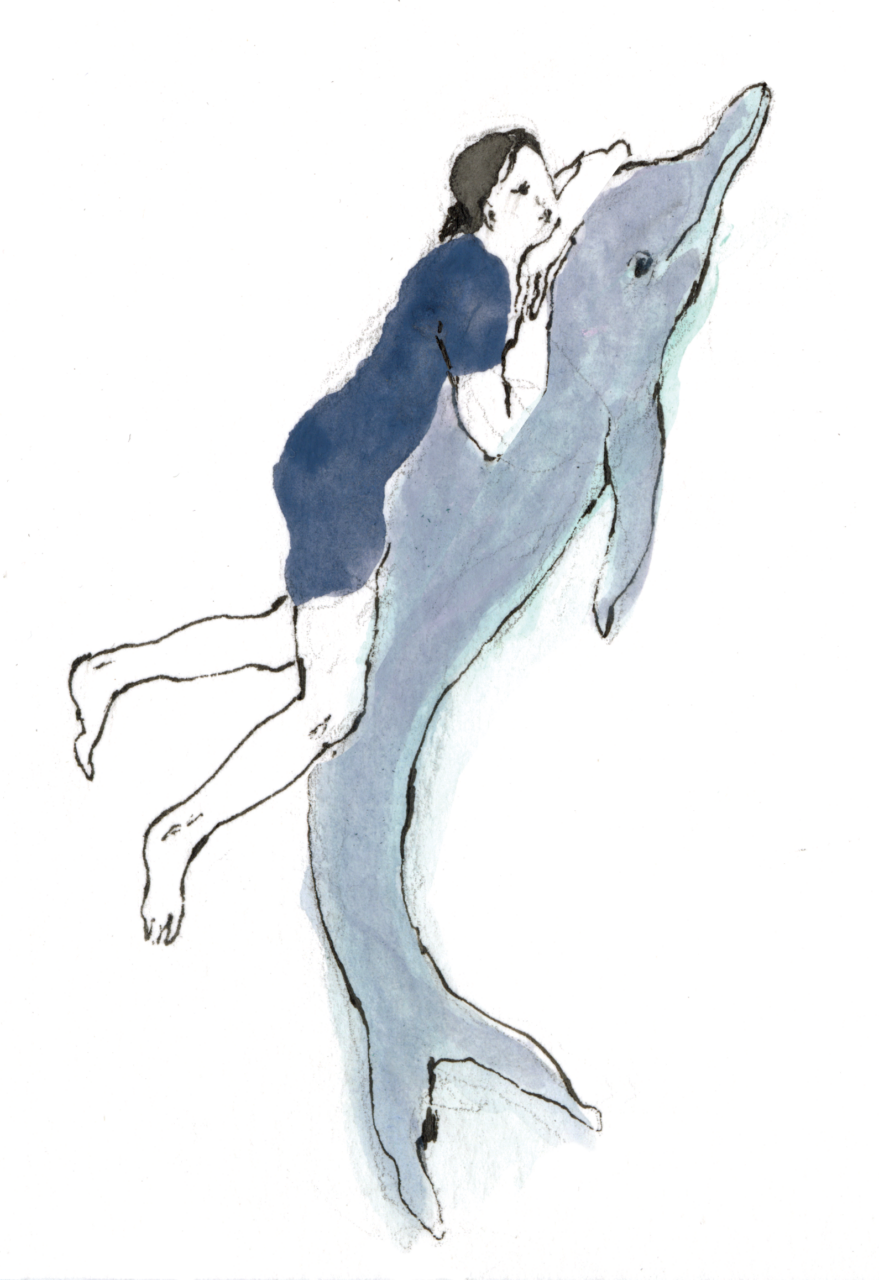
Hai Zi is apparently shy, especially at night, and doesn’t like meeting strangers. They’re rehearsing a skit in which two male divers, playing sharks, overturn Ruan Ling’s raft. Hai Zi appears, chases away the sharks, and carries Ruan Ling back to shore. They’re just doing the beginning tonight. Ruan Ling sits by the side of the pool, legs dangling in the water. Hai Zi nuzzles her feet as she explains the story to him. He seems reluctant and tries to swim away several times, but he always comes back unwillingly when she blows her whistle. Ruan Ling’s story is meticulous. She starts by explaining why she’s on the raft: her boat got into difficulties. Why was she on the boat? She was heading home because she’d dreamed her aged grandfather was lost in the mountains, and wanted to check up on him. If he wasn’t lost, that was fine, but if he was, she would go find him. Ruan Ling’s dormitory is in the northwest corner of theme park, not far from the Ferris wheel, at the end of a gravel path. She refuses to let me walk her, insisting that the compound is locked up at night, so it’s perfectly safe. We exchange phone numbers and wave goodbye. At the exit, I see the picture of me and the seal. There must have been many others, but they’re long gone. I put it in my bag and walk out.
Back home, I take a shower right away — my body stinks of chlorine. My rented apartment is on an upper floor with two bedrooms, one of which I’ve turned into a study. I sit here now, scribbling away. The onion-dome roof of the aquarium is visible through the window. I texted Li Wei on my way back: Are you asleep? No reply. Now, I text: I met a dolphin named Hai Zi today, two meters long, two hundred kilos, but still a pup. Again, silence. I check my teaching materials for tomorrow. I’m delivering a lecture on Flannery O’Connor. In 1964, O’Connor rewrote “Revelation” and put together a new short story collection for publication that fall. At the start of February, tests showed that her anemia was caused by a fibroid tumor. The day before her surgery, she was in her hospital bed editing “Revelation.” Dragging her broken body along, facing death, she never stopped working on her manuscript. I suspect those edits might not have been very meaningful, apart from prolonging her existence. For all we know, dazed from the many drugs she was taking, she may have made the story worse. She no longer thought she would survive but still had something to hope for. As for what that might have been, I’m not sure, but it was definitely of crucial importance. Ruan Ling’s image keeps popping into my mind. She’s pale, not bad-looking, dripping wet, but none of this gives rise to impure thoughts. I recall her bare feet, the mottled red nail polish, Hai Zi grinning as he rubbed her calves. Still nothing. I write awhile longer, scan my seal photo and send it to Li Wei, then put it on the bookcase.
At next morning’s class, the students are mostly alert. At noon, I turn on my phone to find Li Wei still hasn’t replied, which is unlike her. The last time this happened, Snow had had a bad bout of stomach flu, and Li Wei had rushed Snow to the ER, leaving her phone behind. I call her, and it rings a dozen times before cutting off. I do this over and over. Suddenly terrified, I run out into the street and am hailing a cab when a message arrives: Boarding a plane now, won’t be using my phone much for the next week, everything’s okay. I text back: Where are you going? Is Snow with you? Why didn’t you tell me? She replies: Japan, last-minute trip, don’t worry. Snow wants to see Tokyo Disneyland and the aquarium. I told the school she’s going on vacation. I say: All right, bon voyage, get in touch again when you’re somewhere with Wi-Fi. No response.
In the afternoon, there’s an incident at the aquarium. The attendants overfill the pool, and during the feeding session, a few of the piranhas manage to leap ashore. One of them sinks its teeth into a five-year-old boy’s calf, ripping off a chunk of flesh the size of a finger. In the ensuing chaos, the kid’s parents stomp the fish to death, then get into a fistfight with the supervisor. When the ambulance arrives for the boy, it also takes the supervisor, whose nose is broken. After this, the audience for the dolphin show is sparse — I would say no more than twenty people scattered around the pool. At night, Ruan Ling continues training Hai Zi. No sharks this time, just her pretending to fall off the raft into the water. Hai Zi picks her up and sets her down by the side of the pool. Ruan Ling tells him, Not like that, the audience won’t find that thrilling enough — you have to take me round the pool once, and when I tap your nose, that’s when you push me up. The next attempt is unsatisfactory — Hai Zi doesn’t seem to understand what she wants. At the end of the session, Ruan Ling doesn’t give him any fish, and Hai Zi doesn’t complain, just keeps smiling as he swims into the smaller pool that’s like his personal quarters. As we walk out, I ask Ruan Ling, Are Japanese aquariums very different from ours? She shoots me a look: Very different — I visited last year, their training is much stricter. The dolphins jump through flaming hoops, and if you pay enough, your kids get to ride them through the water. I say, Could you do that? She says, No, I couldn’t. The air is extraordinarily still outside, with not a breath of wind. Before we say goodbye, Ruan Ling asks, Did you notice Hai Zi has a sore on his tail? I say, No, was that me? I mean, because I touched him? She says, Nothing to do with you, it appeared a few days ago. He might have to rest up tomorrow, so you should come back the day after.
I can’t sleep that night. It’s unusually warm, and the hum of the air conditioner sounds like waves swirling round the room. I take two cold showers, then sit shirtless in my study. I check my email and find a student from this morning has sent me two short stories, both bad — affected and full of unnecessary metaphors. In the email, she says she’s audited all my open classes and she hopes to get into my master’s program and become a writer. Her contact details are at the bottom of the email. I read the email twice more, then delete it and its attachments. I start mapping out the aquarium article. Perhaps the opening would be something about Hai Zi turning seven and having his first dream: his trainer Ruan Ling shrunk smaller than him, needing his protection. Him sprouting legs at night and climbing onto dry land, retracing her footsteps down the gravel path, all the while thinking of her legs as she walks. I should ask Ruan Ling whether dolphins dream. My phone pings with a message, just four words: There’s a guy here. I imagine Snow, crawling out of bed in the middle of the night, groping for Li Wei’s cell phone, sending this message that she’ll immediately delete from the sent folder, slipping the phone back into place. I want to ask if she’s been to the Tokyo aquarium and ridden a dolphin, but I know she won’t see the text. I go into the trash to find the earlier email, and jot down the girl’s phone number. Then I pull on a T-shirt and call Spring Roll: Are you working today? With music in the background he says, Yes, what’s up? I say, Go get the bottle I left with you. After a pause, he says, You haven’t had a drink in half a year. I say, So you drank it all? He says, I didn’t, actually, I’ll go search for it. I say, Search away, I’ll be there in ten minutes.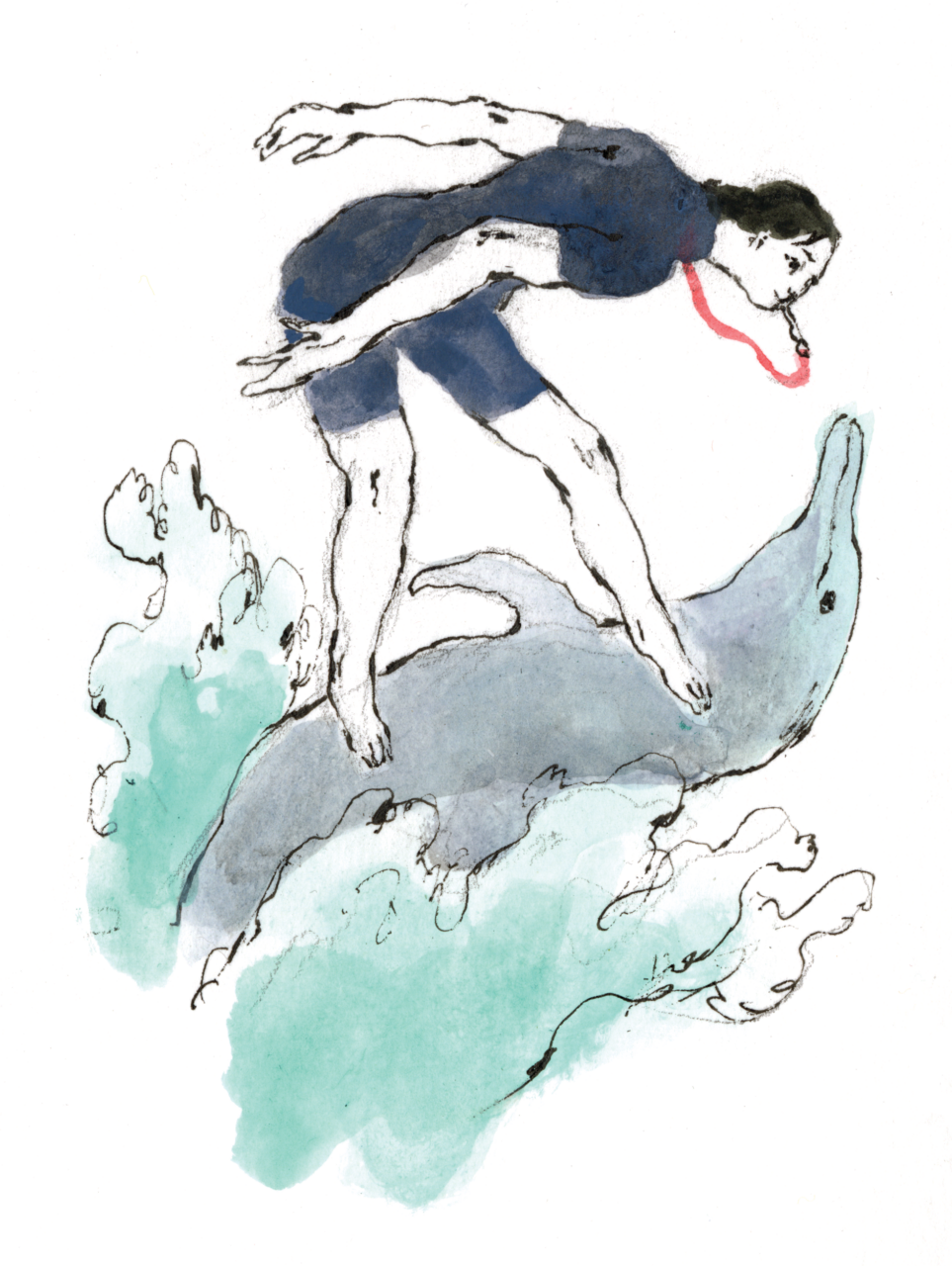
There aren’t many people at the bar. Spring Roll pours me a drink and says, Meeting someone? I empty my glass and say, No, just me. He pours me another and says, The last time you had too much, you ended up sleeping it off on the counter. I say, Yes, I had a crick in my neck the next day. He says, This whiskey isn’t bad, but you ought to keep it another six months for it to get really good. I gulp down a big mouthful and say, I’m scared I’ll lose it, drinking it feels more secure. He laughs: Look who’s playing darts — I had to duck a few times.
That’s when I notice Ruan Ling is here, too, dressed the same as the other night, all alone. One leg forward, one leg back, already drunk. I walk over and say, Want an orange juice? She glances at me and says, No thanks. I say, Can I join you? She says no. A dart flies across the room and lands in a corner. I say, All by yourself? She says, Interviewing me again? I say, No.
I watch her for a while: I just wanted to talk to you, so you’d drink less. She says, Are you the police? Why are you always watching me? I have the right to remain silent, anything I say might be used against me. She’s beautiful in this light, pale cheeks, slender limbs, long neck. I say nothing more, just watch as dart after dart flies every which direction, then help her gather them. She says, You asked me a question before. I say, Yes? She says, You asked if Hai Zi was my first dolphin. I’ll tell you now: no, I had two before him, he’s my third. The first was named Peter, I had him when he was five to seven, and the second was Han, I had him ages six to seven. I say, Uh-huh. She says, They both died. I ask, How? She says, Suicide. Bottlenose dolphins can live forty years in the wild. There were warning signs, the sores on their tails. Like I told you, they use sonar to sense where they are, but they’re in a small pool, not the ocean, and their cries get bounced back and forth, back and forth, until they’re completely disoriented. Our dolphins are basically blind, they can move around only because they’re in a familiar space. I say, Is there nothing you can do? She says, They didn’t make it past seven. Peter slammed his head into the side of the pool, and Han stopped eating. He died in my arms, covered in sores. Hai Zi turned seven this past week, I guess he’s a bit more resilient. I say, But he has a sore on his tail, why does he smile? She stares at me: They’re bottlenose dolphins, you could chop their heads off and they’d still be smiling. I say, There has to be something we can do. We should kidnap him and release him into the ocean. She says, You’d do that with me? I say, Yes. She says, Really? They’ll lock us up. I say, I know some lawyers. She laughs: You’re drunk. I say, We have to do this. I’ll hire a truck and fill it with water, then after we’ve set him free, I’ll turn myself in. I’ll say I made you do it, you’ll get off scot-free. She says, That’s worse. I say, I can write anywhere, maybe prison will be good for me. Without my freedom, I might be able to settle down and write. She is silent for a while, then says, Even if you release him into the ocean, he’ll starve to death, he can’t hunt anymore. He belongs in the pool. I take the darts from her hand and say, Then we have to teach him, we’ll secretly teach him how to hunt, and set him free, or there must be some other way. She stands up straight, not swaying, looks directly into my eyes and says, I need him more than you. I say, Then you think of something. She says, Why do you care so much? Aren’t you a college professor? Isn’t your life fucking great? I say, I don’t want him to die, I just — don’t want him to die. For some reason, tears are streaming down my face and onto my collar. My hands clench around the wine glass and darts, and I wish I could crush them to pieces. She reaches out and taps my shoulder: Let’s go somewhere else. I say, Where? She says, We’ll visit Hai Zi.
The dolphin theater is pitch black. Ruan Ling slips into the darkness and turns on the lights. From the storage area, she gets out the raft and tosses it into the pool, then blows her whistle. Hai Zi appears from somewhere and squeals a few times, then glides over to her feet. Ruan Ling says, Tail. He turns around and extends his tail. She inspects it, then has him swim to the other side. She whispers to me, Like I expected, the sore’s a bit better. If nothing goes wrong, he might live another year. I say, Till he’s eight? She says, Yes, a record. I say, Why? She says, Because he loves me. Of course, so did Peter and Han, but he loves me most of all. I say, The one who loves you most. She says, Right, so he’ll go on living, because of our act. He’ll stay alive to rescue me, over and over again. Even though he knows it’s fake, he still worries some other dolphin will ruin it. So he chooses to believe this is real, and waits to save me day after day. I know it’s a bit cruel, but I can’t think of any other way.
I stand at the edge of the pool, silently watching Hai Zi in the water, watching his shadow. He can’t see anything — all he can do is swim back and forth. I say, Can I get in the water? She asks, Can you swim? I say, Yes, trust me. She says, Three minutes. I repeat, Three minutes. She walks to the water’s edge, reeling a little, murmurs a few words to Hai Zi, then nods at me.
I take my clothes off, every last stitch, and jump in. I clutch his pectoral fin as he slowly glides ahead. Little by little, I get closer, until he’s in my arms. He’s icy cold, but he doesn’t try to get away from me. From above comes a drunken whistle. My body is scalding hot. I press against him as hard as I can, until there’s not a drop of water between us.
